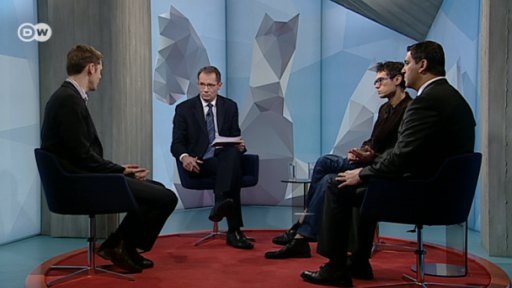Quadriga - Unity Against Terror: Can We Turn the Tide?

This browser does not support the video element.
Will increased security be paid for with an erosion of freedoms? What can Europe do to counter terrorism that doesn't result in wholesale discrimination against Muslims?
How can we stop young people from being drawn into Islamist circles and radicalized? Can information campaigns, education and equal rights play a role in combating violence and fundamentalism? Why are young people so fascinated by organizations like Al-Qaeda & IS? Terror organizations thrive by intimidating and spreading fear and attract new members by staging spectacular attacks. What protection is there against this? Islamist terror attacks occur on a daily basis - "Charlie Hebdo" was no isolated incident - all over the world. Radical Muslims kill people of other faiths in the name of God – though this has nothing to do with Islam according to most people. But how can such deeds be carried out in the name of Islam, how is it that religious belief can be so misused to justify bloody carnage?
Do the pictures that went round the world, of millions marching in solidarity in Paris or the vigil at Brandenburg Gate, send a message to the terrorists that the majority is united against them and is not intimidated?
How can politics strengthen the democratic values of freedom, equality and fraternity? How can we stop a division of society and stem the rise of anti-Semitism and extreme right thinking?
Unity Against Terror: Can We Turn the Tide?
Tell us what you think? Email us at: quadriga(at)dw.de
Our guests:
Amir Musawy - studied media and political science in Bonn, Germany, and has reported for Associated Press in London. He has worked for the Iraqi foreign ministry and several NGOs in his capacity as a political scientist and media consultant. Today he is the Al-Iraquia TV Berlin Bureau Chief. Musawy is the co-author of the documentary film “Bureaucracy of Terror — An Inside Look at the Islamic State”
Daniel Gerlach– He is the founder and editor-in-chief of Zenith, a German magazine focusing on politics, economics and culture in the Middle East. After studying history and Middle Eastern Studies in Hamburg and Paris, he started as a freelance journalist. He is the author for several TV-documentations on the Middle East and the Islamic world. He is also a co-founder of the German publishing house Levante Verlag.
Fabien Jobard - is a political scientist at the Marc Bloch Institute in Berlin. His research concentrates on security measures of the authorities in France and Germany and on the process of radicalisation of young Muslims – especially in French prisons. He recently published: “Rioting in the UK and France. A comparative analysis.”